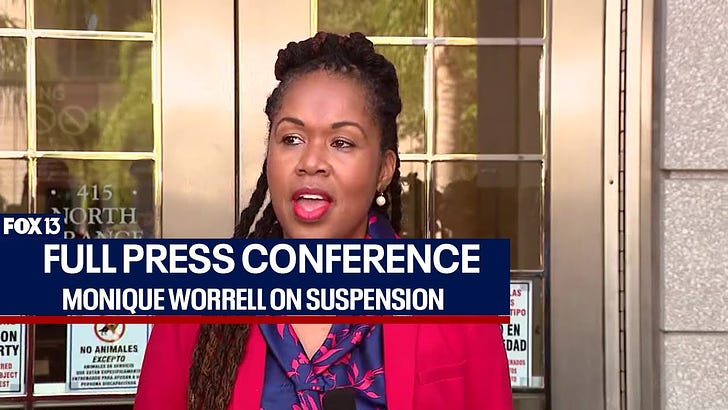Gov. DeSantis suspends Ninth Circuit State Attorney Monique Worrell
Shortly after her election in 2021, Worrell approved DNA testing for two Ninth Circuit capital cases from 1976.
This morning, in an Executive Order, Gov. DeSantis suspended State Attorney Monique Worrell, the elected State Attorney for the Ninth Judicial Circuit of the State of Florida. Worrell has been in office since January 5, 2021.
The reasons for the suspension cited in the Executive Order are primarily related to (1) her office’s failure to “obtain[] meritorious minimum mandatory sentences,” (2) allowing juvenile offenders to “evade incarceration,” and (3) “thwart[ing] the will of the Legislature by preventing or discouraging assistant state attorneys . . . from seeking sentencing enhancements.” In part, the EO states:
Per the Executive Order, Judge Andrew A. Bain is to replace Worrell effective today.
You can watch Gov. DeSantis’s press conference today about the suspension here.
You can watch Worrell’s press conference today reacting to the suspension here.
News Articles
Connections to Florida’s Death Row
A DOC report attached to the Executive Order contains data related to prison admissions from January 1, 2022, to March 31, 2023, showing the rate per 1,000,000 population in each circuit. Here’s the data for capital murder:
While her policies on capital punishment were not cited in the Executive Order, Worrell was in the news in late 2022 for her approval of DNA testing in two capital cases.
Shortly after taking office, Worrell approved DNA testing through the Ninth Circuit’s Conviction Integrity Unit (CIU) for both William Thomas “Tommy” Zeigler and Henry Sireci, both of whom have been on death row since 1976. According to the Tampa Bay Times, both Zeigler and Sireci “faced the same prosecutor and judge in their original trials . . . .” As explained below, their cases have proceeded similarly since then, too.
NOTE: The CIU was created by former Ninth Circuit State Attorney Aramis Ayala. Governor Rick Scott reassigned the prosecution of death-eligible cases in the Ninth Circuit when State Attorney Ayala made statements related to the death penalty just after Hurst v. Florida.1 In August 2017, the Florida Supreme Court issued a decision holding that Governor Scott did not exceed his statutory authority in doing so.
Tommy Zeigler’s Case
Tommy Zeigler just turned 78.
He is one of only two people on Florida’s death row who were sentenced to death as a result of a jury override2—meaning the jury recommended a sentence of life imprisonment without parole but the judge imposed a sentence of death.
His original sentence became final in 1982. Zeigler was under an active death warrant twice—once in 1982 and once in 1986. Both executions were ultimately stayed.
In 1988, the Florida Supreme Court granted resentencing in 1988, ordering “that the new sentencing proceeding be held before only a judge because the jury had recommended life imprisonment.”3 At resentencing, “[t]he judge again imposed the death penalty.”4 His sentence became final in 1991.
Zeigler was denied Hurst relief because his sentence was final before 2002.5
According to the Tampa Bay Times, Zeigler requested DNA testing “half a dozen times during the last 19 years” but was always rejected. He had previously been rejected by the CIU. After Worrell was elected, the Ninth Circuit’s CIU agreed to conduct the testing.
In late 2022, a trial court judge approved Zeigler’s request for the testing. DPIC reports that, “As soon as [the] ruling was finalized in December, more than 100 pieces of previously untested evidence were shipped to a California lab to be tested at Zeigler’s own expense.”
The State appealed the trial court’s ruling to the Florida Supreme Court and filed an Emergency Motion to Stay the Trial Court’s Order Releasing Evidence of DNA Testing. On January 5, 2023, the Florida Supreme Court denied the State’s Emergency Motion to Stay. On February 6, the State filed a notice voluntarily dismissing its appeal. The Court dismissed the case the next day.
News Articles
Henry Sireci’s Case
Henry Sireci just turned 75.
He was originally sentenced to death in 1976. The Florida Supreme Court affirmed his sentence on direct appeal, and it became final in 1982. However, he was later granted a new penalty phase “on grounds that two court-appointed psychiatrists conducted incompetent evaluations at the time of the original trial.”6 At resentencing, the jury recommended a sentence of death by a vote of 11-1.7 His sentence of death became final in 1992.
Before his resentencing, Sireci was under an active death warrant twice—in 1982 and 1986 (the same years as Zeigler). Both executions were ultimately stayed.
Sireci was denied Hurst relief because his sentence was final before 2002.8
In May 2021, Worrell also agreed to DNA testing through the CIU in Henry Sireci’s case.
DPIC reported that Attorney General Moody’s actions in Ziegler’s case were “part of a pattern of fighting DNA testing agreements made by . . . Worrell. In July 2022, the Florida Supreme Court rejected Moody’s motion to block DNA testing authorized in a court-approved agreement between Worrell and Henry Sireci . . . .”
Here’s the docket entry from the Florida Supreme Court:
News Articles
It is unclear whether the CIU will continue operations after Worrell’s suspension.
Asay v. State, 210 So. 3d 1, 29 (Fla. 2016) (Labarga, C.J., concurring).
Zeigler v. State, 580 So. 2d 127, 128 (Fla. 1991).
Id.
Sireci v. State, 587 So. 2d 450, 451 (Fla. 1991).
Id.








